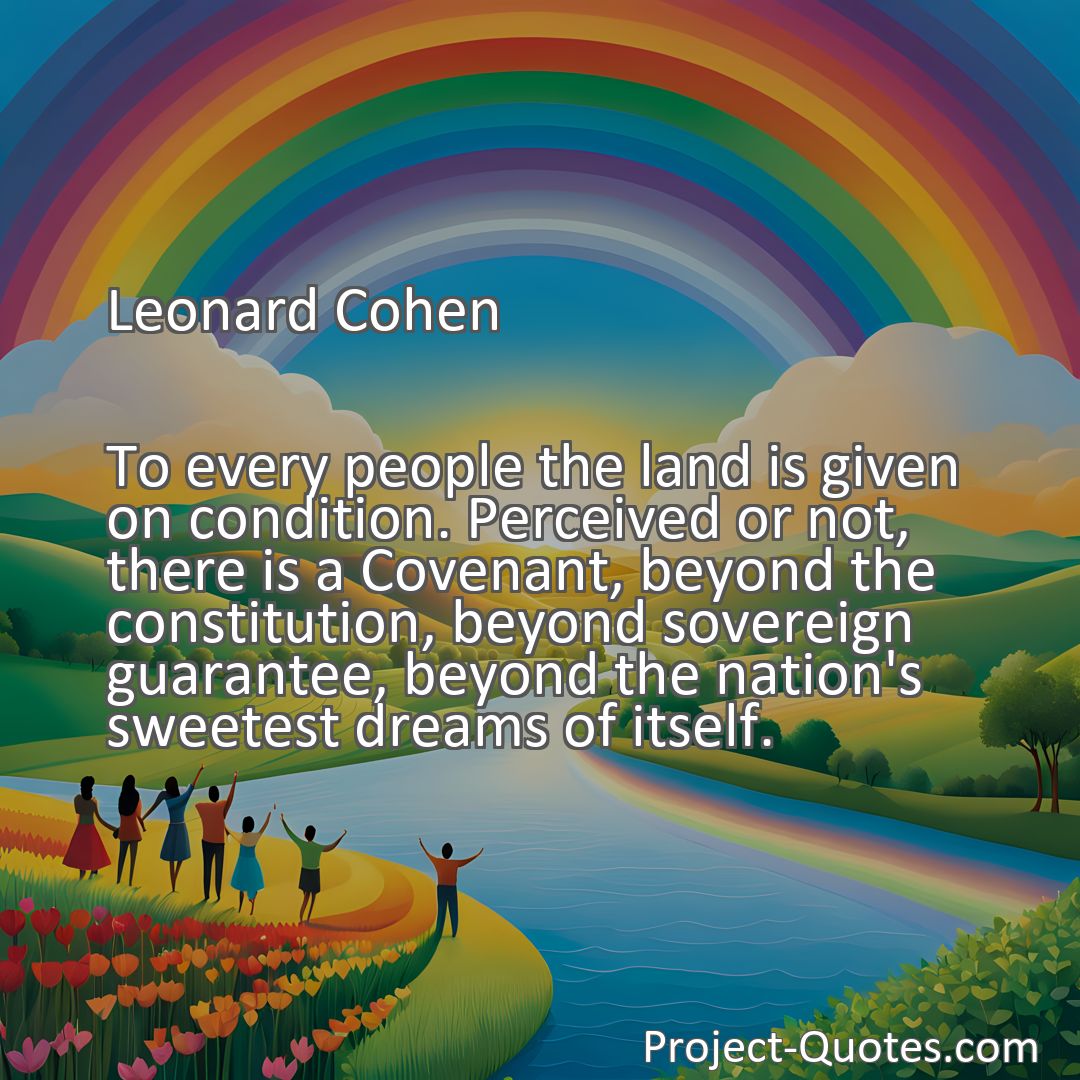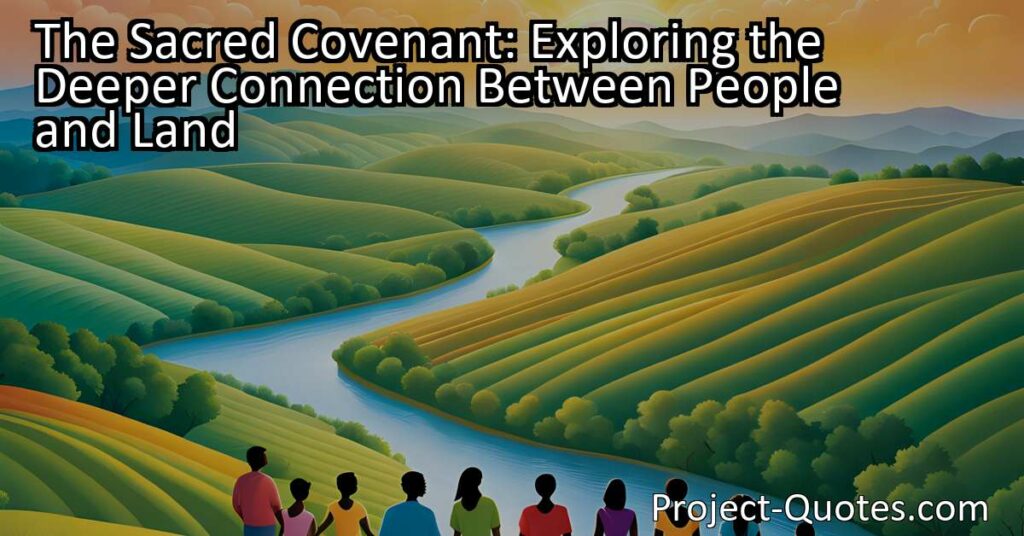To every people the land is given on condition. Perceived or not, there is a Covenant, beyond the constitution, beyond sovereign guarantee, beyond the nation’s sweetest dreams of itself.
Leonard Cohen
The Sacred Covenant: Exploring the Deeper Connection Between People and LandOwnership of land is not simply about possession, but a responsibility and mutual respect. The quote suggests a sacred nature to the connection between people and their land, highlighting a deeper, spiritual dimension. It challenges us to consider the intangible aspects that go beyond legal frameworks and political boundaries. By acknowledging and embracing this covenant, we can create a more sustainable and interconnected future.
Table of Contents
- 1 To every people the land is given on condition. Perceived or not, there is a Covenant, beyond the constitution, beyond sovereign guarantee, beyond the nation’s sweetest dreams of itself.
- 2 Leonard Cohen
- 3 Meaning of Quote – To every people the land is given on condition. Perceived or not, there is a Covenant, beyond the constitution, beyond sovereign guarantee, beyond the nation’s sweetest dreams of itself.
- 4 Freely Shareable Quote Image
- 5 Related
Meaning of Quote – To every people the land is given on condition. Perceived or not, there is a Covenant, beyond the constitution, beyond sovereign guarantee, beyond the nation’s sweetest dreams of itself.
In this quote, the idea of a land being given to its people on certain conditions is discussed. It emphasizes the presence of an unspoken agreement, a covenant, that goes beyond written constitutions, sovereign guarantees, and even the nation’s own perception of itself. This profound notion of a deeper connection between the people and the land opens up a vast array of interpretations and implications. So, let’s delve into the layers of meaning and significance behind this quote.
First and foremost, the quote suggests that ownership of land is not simply a matter of possession, but rather a responsibility. It implies that being given a piece of land comes with certain obligations and expectations. Just like any relationship, this bond between people and their land requires reciprocity and mutual respect. It hints at the idea that we must take care of the land, nurture it, and preserve it for future generations.
Furthermore, the quote highlights the concept of a covenant, a term often associated with religious or spiritual contexts. By using this word, the author suggests a sacred nature to the connection between people and their land. It implies that this bond is not solely based on legal documents or materialistic gains, but there is a deeper, perhaps even spiritual, dimension involved. It is as if the land itself holds a special place in the hearts and souls of its inhabitants.
The quote also implies that this covenant exists independently of written constitutions and sovereign guarantees. Constitutions and government assurances may define the legal framework within which land is owned and governed, but they do not capture the essence of the relationship between people and their land. This notion challenges us to consider those intangible aspects that cannot be easily quantified or regulated. It urges us to think beyond the confines of legal systems and explore the emotional and cultural ties that people have with their land.
Moreover, the quote suggests that there is a deeper understanding of the land that surpasses the nation’s perception of itself. It proposes that the land has its own identity, rooted in history, tradition, and culture. This reminds us that the bond between people and their land extends beyond the political boundaries that define a nation. It implies that the land possesses a narrative that predates any nationalistic sentiments and that it should be respected and celebrated for its unique qualities.
When we consider this quote, we can reflect on how it applies not only to nations but also to individuals and communities. It prompts us to consider our own relationship with the land we inhabit and how we perceive it. Are we conscious of the conditions attached to our stewardship of the land? Perhaps we should ask ourselves whether we are fulfilling our responsibilities to the land, including environmental conservation and sustainable practices.
In addition, this quote raises questions about the impact of colonization and land dispossession. Historically, indigenous communities have had their lands taken away without their consent. The quote reminds us of the unjust nature of such acts, suggesting that when land is given, it should be respected and protected. It calls for acknowledging the historical injustices and for working towards reconciliation and land restorations.
Expanding on the historical context, it is important to consider how the quote resonates with the struggles for civil rights and equality. African Americans, for example, have fought against racial discrimination and inequality throughout history, often seeking justice and freedom on the very land they were brought to as slaves. This quote speaks to the deeper aspirations and dreams held by marginalized communities, highlighting that the mere existence of a constitution does not guarantee the fulfillment of their rights.
In a broader sense, the quote challenges us to question the concept of ownership itself. It evokes the idea that the land is a shared resource, belonging to all its inhabitants. This urges us to consider sustainable land management practices that prioritize the well-being of both people and the environment. It encourages a collective responsibility for the land and promotes a mindset of stewardship rather than exploitation.
As we wrap up our exploration, it becomes clear that this quote holds profound implications for our understanding of the relationship between people and land. It challenges us to transcend legal frameworks and delve into the cultural, spiritual, and historical dimensions that shape this connection. It reminds us that ownership of land comes with responsibilities and expectations. It calls for a broader perspective that encompasses environmental sustainability, social justice, and collective stewardship. Perhaps, by acknowledging and embracing the covenant between people and their land, we can forge a more harmonious and interconnected future.
I hope this quote inspired image brings you hope and peace. Share it with someone who needs it today!


